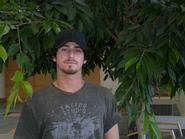
As the European Union becomes ever more of a cohesive political entity, its place in the arena of international affairs is a matter of increasing interest in the U.S. "The formation of an increasingly powerful Union resonates in the American mind," says Zachary Cohen '09, a politics major from Brooklyn, N.Y., recalling images of "the last world power, the Soviet Union." Since America has recently enjoyed a role as the world's only superpower, Cohen says, it is important to study the nation's evolving view of the European Union.
This summer, Cohen will research the change in American attitudes toward the European Union since the start of the conflict in Iraq in 2003. Cohen is collaborating with Alan Cafruny, the Henry Platt Bristol Professor of International Affairs, pursuing a research project funded by the Emerson Foundation Grant program. The program, established in 1997, provides students with significant opportunities to work collaboratively with faculty members, researching an area of interest.
Cohen's research focuses on changes in governmental, media, and public attitudes towards Europe in the last five years. He uses books, periodicals, and tabloid journals as well as polls and legislative acts to assess how Americans' opinions have evolved. So far, he has found an increase in pro-European opinion, but he says that attitudes vary depending on the particular issue being discussed. According to Cohen, some issues, such as universal health care reform, have a "European" connotation, while others such as militarization are perceived as more "American."
Cohen first studied the European Union while participating in a study abroad program last fall in Morocco, where he took a class on the subject. "My interest has grown from there," he says. After taking a course on the European Union from Cafruny, his advisor, he decided to pursue further research during the summer. He hopes to use his project as the basis for a senior thesis.
One of the difficult aspects of his project, Cohen says, is finding sources, since the topic is so specific. Although information on European attitudes toward America are not too difficult to find, finding sources for changing American opinions of Europe is more complicated. However, he has been surprised to find that the public's attitude toward Europe in the last five years has not been as negative as he expected. "I didn't think Americans would have a pro-European mindset. The American government and the media blew it out of proportion," he says, citing the government's anti-French sentiment at the beginning of the Iraq conflict, which led to the rechristening of French Fries as "Freedom Fries" in the cafeteria of the House of Representatives.
In general, however, he sees the American people as moving towards a more "European" mindset, while the government adapts to increased globalization. "American exceptionalism has been affected," he says. "People are promoting greater relations with Europe."
Cohen, a rising senior, pitches for the Hamilton baseball team. After he graduates, he intends to pursue graduate work in trans-Atlantic relations.
-- by Laura Bramley
This summer, Cohen will research the change in American attitudes toward the European Union since the start of the conflict in Iraq in 2003. Cohen is collaborating with Alan Cafruny, the Henry Platt Bristol Professor of International Affairs, pursuing a research project funded by the Emerson Foundation Grant program. The program, established in 1997, provides students with significant opportunities to work collaboratively with faculty members, researching an area of interest.
Cohen's research focuses on changes in governmental, media, and public attitudes towards Europe in the last five years. He uses books, periodicals, and tabloid journals as well as polls and legislative acts to assess how Americans' opinions have evolved. So far, he has found an increase in pro-European opinion, but he says that attitudes vary depending on the particular issue being discussed. According to Cohen, some issues, such as universal health care reform, have a "European" connotation, while others such as militarization are perceived as more "American."
Cohen first studied the European Union while participating in a study abroad program last fall in Morocco, where he took a class on the subject. "My interest has grown from there," he says. After taking a course on the European Union from Cafruny, his advisor, he decided to pursue further research during the summer. He hopes to use his project as the basis for a senior thesis.
One of the difficult aspects of his project, Cohen says, is finding sources, since the topic is so specific. Although information on European attitudes toward America are not too difficult to find, finding sources for changing American opinions of Europe is more complicated. However, he has been surprised to find that the public's attitude toward Europe in the last five years has not been as negative as he expected. "I didn't think Americans would have a pro-European mindset. The American government and the media blew it out of proportion," he says, citing the government's anti-French sentiment at the beginning of the Iraq conflict, which led to the rechristening of French Fries as "Freedom Fries" in the cafeteria of the House of Representatives.
In general, however, he sees the American people as moving towards a more "European" mindset, while the government adapts to increased globalization. "American exceptionalism has been affected," he says. "People are promoting greater relations with Europe."
Cohen, a rising senior, pitches for the Hamilton baseball team. After he graduates, he intends to pursue graduate work in trans-Atlantic relations.
-- by Laura Bramley
Posted July 7, 2008
